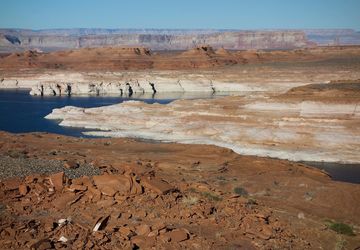Both contemporary and historical perspectives on belonging in the outdoors can be contentious for people of color, especially African-Americans, within the United States. In the evening of Thursday, May 16th, professor, author, and environmental activist Carolyn Finney, PhD, spoke to an audience in Cubberley Auditorium about this and other themes related to environmental justice. A skilled storyteller, Finney seamlessly interwove personal stories with the narratives of other environmental advocates of color in order to paint a nuanced view of African-Americans’ relationships to nature, the Great Outdoors, and environmentalism in general.
Stories of Memory
Through her talk, Finney encouraged audience members to take an expansive approach when defining environmentalism, arguing that personal attachment to and care of the land – especially care of the land by people of color – is oftentimes not regarded as environmentalism. To this point, Finney reflected on her own upbringing; for a large portion of her life, Finney’s parents were the primary groundspeople for a massive estate owned by a wealthy New York-based family. She talked about her parents’ stewardship of the land, and also the emotional impact her parents felt after moving off the land they had tended for many decades. “Land is not just land”, Finney said. “Land is a symbol of political and economic power”. In the case of her parents and countless others, land also contains significant memorial value that must be considered when debating land use and conservation.
Finney also introduced the story of MaVynee Betsch, an environmental justice activist who devoted decades of her life to preserving American Beach, a historic beachfront in Amelia Island, Florida. Betsch’s grandfather – a wealthy Florida businessman – had founded American Beach as a place of escape for Black Americans during the time of Jim Crow. For Betsch, Finney stated, conservation efforts at American Beach were important not only to prevent the environmental degradation of the beachfront, but also to preserve it as a significant site of African-American history and connection to the outdoors, specifically as a place that offered Black Americans a haven during a time when there were few other alternatives. Conservationism, therefore, is the work of preserving history in addition to preserving physical space.
Reconciling History and Moving Forward
While reflecting on this and other perspectives of Black Americans in the outdoors, Finney managed to counteract the pervasive narrative that people of color are not as invested in environmentalism. Finney contends that it is necessary to recognize the systemic barriers--past, present, and future—that shape people’s relationships to nature and environmentalism. Finney’s lecture encouraged listeners to expand their notion of what environmentalism is and the inherent value that it has for society.



